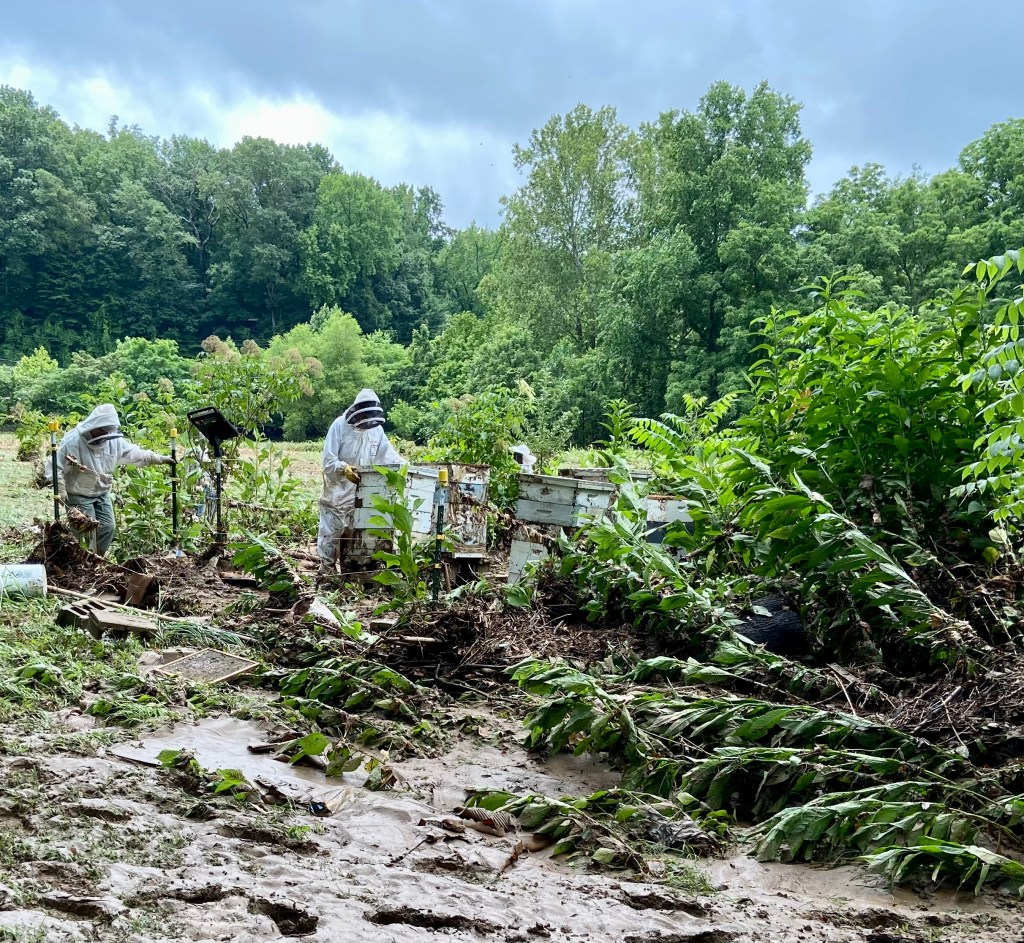Flooding washes away small farm’s crops, honeybees
Published 11:48 am Thursday, June 22, 2023

- Volunteers attempting to save bee hives after Pacolet River flooding. (Photo by Larry McDermott)
|
Getting your Trinity Audio player ready...
|
Carl and Angelina Pleasants’ little farm on the Pacolet River in Lynn was nearly washed away a few days ago when the swollen stream came rushing through like a freight train in the darkness.
The Pleasants had the making of a bumper food crop. Berries were ripening with the sweetness of summer. Vegetables were screaming out, “Pick me! Pick me!” Fifty or more tomato plants were freshly staked and prepped for river bottom deliciousness. Honeybees were working overtime foraging the crops and packing drawn comb cells with sweet and rich honey due to be harvested in the days ahead.
Each year their bountiful crop plays an integral role in the operations of The Rural Seed restaurant in Columbus. On any given night during the growing season, you can tell what Chef John Wilson has received from the Pleasants’ huge garden by looking at the menu.
Trending
Carl, John and his wife Adrienne, the pastry chef, have made The Rural Seed the region’s foremost farm-to-table restaurant, buying meat, vegetables, fruit and other products from a long list of local farmers.
Then came the rush of the Pacolet fueled by nearly a foot of rain up river, out of its banks and 6 to 8 feet high over all the crops as well as Angelina’s beloved beehives, leaving behind a thick bed of silt looking like the world’s largest chocolate soft-serve ice cream machine had overflowed.
And then, something happened that makes us special.
While the restaurant was closed for vacation and the Pleasants were out of state hiking and enjoying nature, a small group of friends, family and farmers gathered on the bank and began cleaning up the river’s wrath.
As farm manager, Angelina has become a driving force behind its success, and rescuing her honeybees was the first order of business.
Honeybees are an amazingly resourceful society. Inside each hive, the bees divide up responsibilities based on their age ranging from housekeeping, nursing, undertaking (as in removal of the deceased), and cell mending to foraging, the most sought-after job because it means going out to gather pollen and nectar.
Trending
While they are masters at cleaning themselves, the flood was like nothing they had ever experienced, and their fate is now uncertain. At the scene, hives were knocked off their foundations and tossed about in the roiling water. Thousands of bees were stuck in the muck, their final fate, while others buzzed around in an agitated state.
A dozen volunteers slogged through the boot-sucking river muck to retrieve the boxes scattered about like a Lego set and reassembled them on a small landscape trailer pulled to the scene by a small excavator. They were to be moved at night to high-and-dry ground a few miles away after the thousands of foraging bees returned to their hives by dusk.
The financial loss for the farm will be huge, but the real pain comes from knowing that overnight their countless hours of work, sweat, blisters and aching backs to produce a magnificent crop were lost, along with thousands of dollars worth of unplanted seed, tools, equipment, 8 tons of garden mulch, and a dozen rain barrels. All of the greens and most of the tomatoes are gone.
“Angelina and I have been taking turns on who is going to cry,” Carl said. “It’s just a lot of work and we have to rethink our whole approach because we can’t do this again. So no summer crops this year. I’ll do my damndest to get in a fall crop, but there is a foot of mud in the field.”
What the river and its flooding did produce, however, was yet another example of the determination of family and friends to rally and help others in small-town Western North Carolina.

Volunteers attempting to save bee hives after Pacolet River flooding. (Photo by Larry McDermott)
Larry McDermott is a local retired farmer/journalist. Reach him at hardscrabblehollow@gmail.com
Flood waters reached about 6 feet high at the Pleasants’ barn. (Photo by Larry McDermott)





